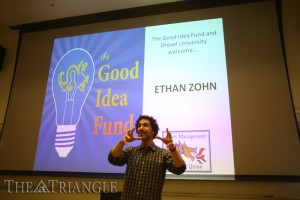Drexel’s Good Idea Fund and Sport Management Student Union came together to host Ethan Zohn May 28 in the Papadakis Integrated Sciences Building. Through the course of his lecture, Zohn shared the life lessons he learned from his experience as a philanthropist, two-time cancer survivor and winner of the third season of “Survivor.”
Many of the attendees were fans of “Survivor” and were excited to see the man they had previously only seen on television and in magazines. Matthew Jolles, a sophomore entertainment and arts management major, was among the attendees, and expressed his desire to hear more about how Zohn “took a million dollars and turned it into the ultimate service project.”
The event began shortly after 7:30 p.m. Kevin Giordano, a junior sport management major and president of Drexel’s Sport Management Student Union, provided a brief biography of the speaker and overview of the night’s topic in his introductory speech.
Zohn discussed the idea that every individual can control the impact of adversity on his or her own life. After winning the million-dollar prize on “Survivor: Africa,” Zohn learned that he had developed a rare form of cancer. Despite the hardships of his diagnosis, Zohn found that cancer helped him refocus.
“It made me realize that there’s one absolute truth … that we’re all survivors on this earth for a very short time. It’s not about how or when we leave this world; it’s what we do to make the most of each day, in each crisis, while we’re here,” he said.
For Zohn, the glow of fame and fortune soon faded, and he found himself confronted with the realization that he would never feel fulfilled if he spent the money he won on himself.
He shared with the audience when he first felt the reward of giving back. Zohn had brought along a hacky sack while he was on “Survivor,” which was the only “luxury item” he was allowed. Although he said this memento served as his sole connection to his life back at home, he gave it to a Kenyan boy he met during the filming of the show.
“It wasn’t until I saw the happiness, the glee, in this little boy’s eyes that I could truly understand,” he said.
Zohn realized that he didn’t suffer from that act of sacrifice. “Once all my distractions were taken away from me, I was left with nothing more than the bare essentials of who I am. … All that you’re left with is your character, your values and the very essence of the human spirit.”
Zohn also introduced his “top four tips to survive.” He reinforced his first tip, to be unselfish, with an example from his experience on “Survivor” when he sacrificed a personal victory so that another could succeed. The second tip, be a leader, helped him not only in his time as a member of the Cape Cod Crusaders, a minor league soccer team, but also to win “Survivor.”
The third tip was to be a teacher. He told the audience a story about his own experience with cultural ignorance and how he managed to take the potentially offensive situation and turn it into a teachable moment. The fourth and final tip instructed audience members to be a member of the community. Zohn explained that he made himself key to his tribe’s survival on “Survivor,” which helped him to win his season without ever having a teammate vote against him.
At the age of 14, Zohn had one of his first encounters with misfortune when he lost his father to cancer. Zohn himself developed cancer twice and was treated through a series of stem cell treatments.
“There were times when I felt like my entire body had turned against me,” he said.
Rather than let himself be burdened by the circumstances, Zohn said he dug deep to find the character he needed to pull through.
Zohn turned the focus of the lecture to his work in Africa. He explained that at first glance, Zimbabwe is filled with natural beauty and a vibrant people. Beneath the surface, however, lies the poverty, overcrowding and the destruction left in the wake of AIDS. Zohn said he initially tried to hide from this uncomfortable truth but then decided to take a stand. He now runs a charity called Grassroots Soccer, which uses “the power of soccer to fight HIV and AIDS.” Soccer is a staple of African culture, so Zohn and his colleagues employ coaches and players to reach out to the communities and fight the taboo that is HIV and AIDS.
Zohn concluded with a quote from Martin Luther King Jr.: “The ultimate measure of a man is not where he stands in moments of comfort but where he stands in moments of challenge and controversy.” Zohn qualified this statement by saying that although challenges may seem more difficult than one can bear, they offer the tools one needs to survive. Zohn ended his talk by saying, “Figure out what makes your heart break, and then go out there and do something about it.”
The event was funded in full by The Good Idea Fund when a group of Sport Management Student Union officers presented their campaign to bring Zohn to Drexel’s campus.
“We pretty much felt that this gave a broad range of aspects for students to come in and join the event,” Andrea Shaw, coordinator of campus activities and adviser for The Good Idea Fund, said,
Giordano, who was responsible for reaching out to Zohn, commented after the lecture: “I thought it went well. He certainly got to everyone in one way or another. His message was clear in trying to inspire us and challenge us to give back to the community.”



